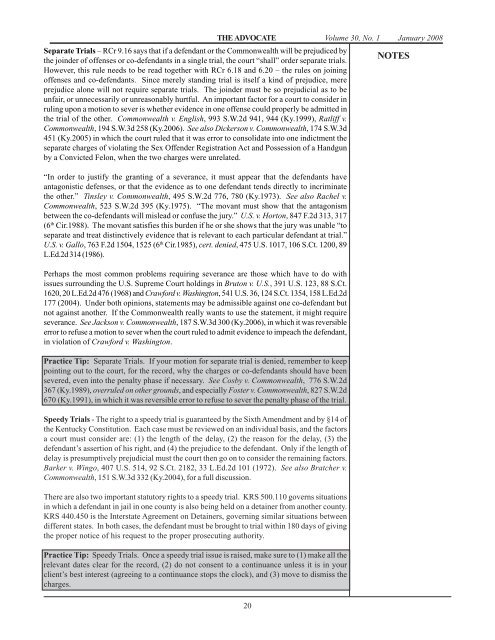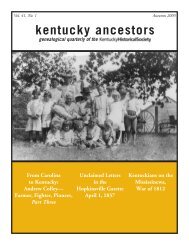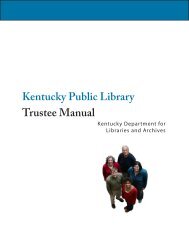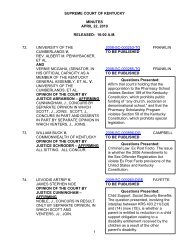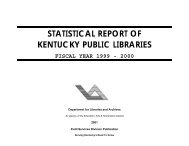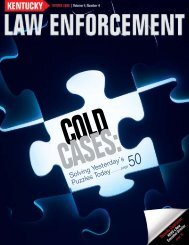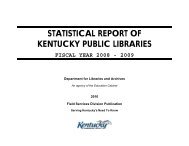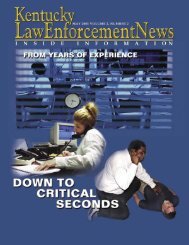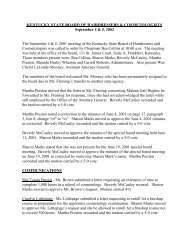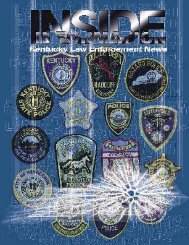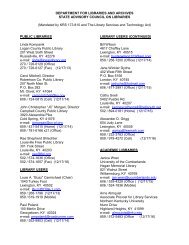Jan08 Advo.pmd - e-archives Home
Jan08 Advo.pmd - e-archives Home
Jan08 Advo.pmd - e-archives Home
Create successful ePaper yourself
Turn your PDF publications into a flip-book with our unique Google optimized e-Paper software.
THE ADVOCATE Volume 30, No. 1 January 2008<br />
Separate Trials – RCr 9.16 says that if a defendant or the Commonwealth will be prejudiced by<br />
the joinder of offenses or co-defendants in a single trial, the court “shall” order separate trials.<br />
However, this rule needs to be read together with RCr 6.18 and 6.20 – the rules on joining<br />
offenses and co-defendants. Since merely standing trial is itself a kind of prejudice, mere<br />
prejudice alone will not require separate trials. The joinder must be so prejudicial as to be<br />
unfair, or unnecessarily or unreasonably hurtful. An important factor for a court to consider in<br />
ruling upon a motion to sever is whether evidence in one offense could properly be admitted in<br />
the trial of the other. Commonwealth v. English, 993 S.W.2d 941, 944 (Ky.1999), Ratliff v.<br />
Commonwealth, 194 S.W.3d 258 (Ky.2006). See also Dickerson v. Commonwealth, 174 S.W.3d<br />
451 (Ky.2005) in which the court ruled that it was error to consolidate into one indictment the<br />
separate charges of violating the Sex Offender Registration Act and Possession of a Handgun<br />
by a Convicted Felon, when the two charges were unrelated.<br />
“In order to justify the granting of a severance, it must appear that the defendants have<br />
antagonistic defenses, or that the evidence as to one defendant tends directly to incriminate<br />
the other.” Tinsley v. Commonwealth, 495 S.W.2d 776, 780 (Ky.1973). See also Rachel v.<br />
Commonwealth, 523 S.W.2d 395 (Ky.1975). “The movant must show that the antagonism<br />
between the co-defendants will mislead or confuse the jury.” U.S. v. Horton, 847 F.2d 313, 317<br />
(6 th Cir.1988). The movant satisfies this burden if he or she shows that the jury was unable “to<br />
separate and treat distinctively evidence that is relevant to each particular defendant at trial.”<br />
U.S. v. Gallo, 763 F.2d 1504, 1525 (6 th Cir.1985), cert. denied, 475 U.S. 1017, 106 S.Ct. 1200, 89<br />
L.Ed.2d 314 (1986).<br />
Perhaps the most common problems requiring severance are those which have to do with<br />
issues surrounding the U.S. Supreme Court holdings in Bruton v. U.S., 391 U.S. 123, 88 S.Ct.<br />
1620, 20 L.Ed.2d 476 (1968) and Crawford v. Washington, 541 U.S. 36, 124 S.Ct. 1354, 158 L.Ed.2d<br />
177 (2004). Under both opinions, statements may be admissible against one co-defendant but<br />
not against another. If the Commonwealth really wants to use the statement, it might require<br />
severance. See Jackson v. Commonwealth, 187 S.W.3d 300 (Ky.2006), in which it was reversible<br />
error to refuse a motion to sever when the court ruled to admit evidence to impeach the defendant,<br />
in violation of Crawford v. Washington.<br />
Practice Tip: Separate Trials. If your motion for separate trial is denied, remember to keep<br />
pointing out to the court, for the record, why the charges or co-defendants should have been<br />
severed, even into the penalty phase if necessary. See Cosby v. Commonwealth, 776 S.W.2d<br />
367 (Ky.1989), overruled on other grounds, and especially Foster v. Commonwealth, 827 S.W.2d<br />
670 (Ky.1991), in which it was reversible error to refuse to sever the penalty phase of the trial.<br />
Speedy Trials - The right to a speedy trial is guaranteed by the Sixth Amendment and by §14 of<br />
the Kentucky Constitution. Each case must be reviewed on an individual basis, and the factors<br />
a court must consider are: (1) the length of the delay, (2) the reason for the delay, (3) the<br />
defendant’s assertion of his right, and (4) the prejudice to the defendant. Only if the length of<br />
delay is presumptively prejudicial must the court then go on to consider the remaining factors.<br />
Barker v. Wingo, 407 U.S. 514, 92 S.Ct. 2182, 33 L.Ed.2d 101 (1972). See also Bratcher v.<br />
Commonwealth, 151 S.W.3d 332 (Ky.2004), for a full discussion.<br />
There are also two important statutory rights to a speedy trial. KRS 500.110 governs situations<br />
in which a defendant in jail in one county is also being held on a detainer from another county.<br />
KRS 440.450 is the Interstate Agreement on Detainers, governing similar situations between<br />
different states. In both cases, the defendant must be brought to trial within 180 days of giving<br />
the proper notice of his request to the proper prosecuting authority.<br />
Practice Tip: Speedy Trials. Once a speedy trial issue is raised, make sure to (1) make all the<br />
relevant dates clear for the record, (2) do not consent to a continuance unless it is in your<br />
client’s best interest (agreeing to a continuance stops the clock), and (3) move to dismiss the<br />
charges.<br />
20<br />
NOTES


